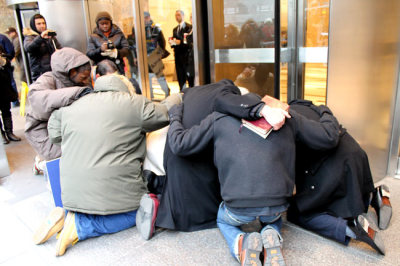NYC Churches Shut Out of Public Schools Starting Sunday

Although the New York State Senate has passed an amendment that would reverse the New York City Board of Education and Mayor Michael Bloomberg's decision to evict nearly 70 churches from the public school spaces they have been renting, many of them for years, most of these congregations are already packed up and prepared for an exodus as the deadline for departure is this Sunday, Feb. 12.
The state Senate overwhelmingly voted Monday 52-7 in favor of Bill A8800A/S.6087A but the NY State Assembly also has to approve its own version of the bill to successfully block the City and mayor's attempt to evict these congregations, located across all five NYC boroughs, from the public school facilities they have been using as their ministry homes. These public schools, located in Brooklyn, the Bronx, Queens, Staten Island and Manhattan, are used for private services by these small congregations when schools are not in session.
Among the estimated 68 churches now caught in a bind is the Bronx House of Faith, whose challenge of the Board of Education's policy was defeated in June 2011 in the Second Circuit Court of Appeals. The appeals court ruled that the board was allowed to enforce a policy that prohibits public schools from being used for "religious workshop services, or otherwise using a school as a house of worship." While affirming that the Board of Education can, if it chooses, prohibit "worship" at its public schools, the court also decided that churches are allowed to partake in other religious activities, such as prayer meetings and hymn singing. The Supreme Court refused in December to hear the church's appeal, so the ruling stands, as does the Feb. 12 deadline, despite efforts by lawmakers to reverse the enactment of the policy.
Dissenting lawmakers are apparently concerned about upholding the constitutional call for separation of church and state, with many of them arguing that allowing these Christian congregations to gather is offensive to students of other faiths who attend these schools — although these churches gather when schools are not in session.
According to attorney Jordan Lorence of the Alliance Defense Fund, a legal group that has been at the forefront of this battle for equal access, allowing private groups to gather in public facilities is not a violation of the U.S. Constitution.
"The Supreme Court has addressed this issue at least five times since 1981," Lorence explains on ADF's "Speak Up" website. "When the government opens a building for expression by private groups, it cannot deny access to religious groups. The Supreme Court has explicitly rejected the Establishment Clause as a reason justifying this kind of exclusion, because these are private religious speakers, not endorsed by the government. Government accommodation of private speakers does not mean the government endorses their messages."
Despite state lawmakers on both sides of the aisle agreeing with that argument, some officials have expressed concerns that this particular case involving NYC churches not only shows favoritism to a specific group, but could also open the door for radical or fringe groups to use public schools as meeting places.
Donna Lieberman, Executive Director of the New York Civil Liberties Union, argued during a City Council hearing that lawmakers must fight against these churches for the sake of upholding religious freedom — that the Board of Education would essentially be endorsing one religious group over others if it continued to allow these Christian churches to rent out public school facilities.
Another City Council member, Jessica Lappin, penned a letter before the Feb. 2 hearing expressing outrage that "about 160 New York City schools are doubling as churches." Lappin found it particularly disturbing that these ministries use these public spaces for free or for minimal fees.
"Even worse, some are using taxpayer-subsidized space to preach hatred of homosexuals and people of other faiths," Lappin alleges.
Assembly Speaker Sheldon Silver (D-Manhattan) called the bill passed by the Senate "flawed," and said "it would open up the schools to anybody," including the Ku Klux Klan.
However, Silver has reportedly gone behind closed doors to help improve the language of the bill that would force the City to re-consider its ban on churches meeting in empty public schools. Silver's "improvements" reportedly include language that would appease both the churches and their supporters as well as dissenters. The New York Daily News reports that Silver and his attorneys would provide grounds for civil liberties advocates to later ask a court to carry out the evictions.
As the legal wrangling in Albany continues, these uprooted churches are faced with the immediate worry of where they will be worshiping next, because although the state Assembly could very well vote in their favor, observers say such a result is not likely to come for months.
While other congregations with established homes have opened their doors to these ministries, some of these churches are still finding it difficult to simply pack up and leave the neighborhoods they have called home, and sever the precious relationships they have fostered with the schools and local residents.
The Rev. Jon Storck, who leads Grace Fellowship Church in Queens, has been holding services at Public School 150 for more than five years. Storck shared with the New York Daily News that he fears being uprooted from the community would mean a loss of more than half of his congregation, which has only found a temporary home for the next two months.
Many of NYC's Christians have banned together to push back against what they view as religious persecution that could very well affect churches across the nation. According to Lorence of the Alliance Defense Fund, no other cities have enacted a ban like the one NYC Chancellor of Education Dennis Wolcott has put forth, and no city has been sued for violating the First Amendment.






















